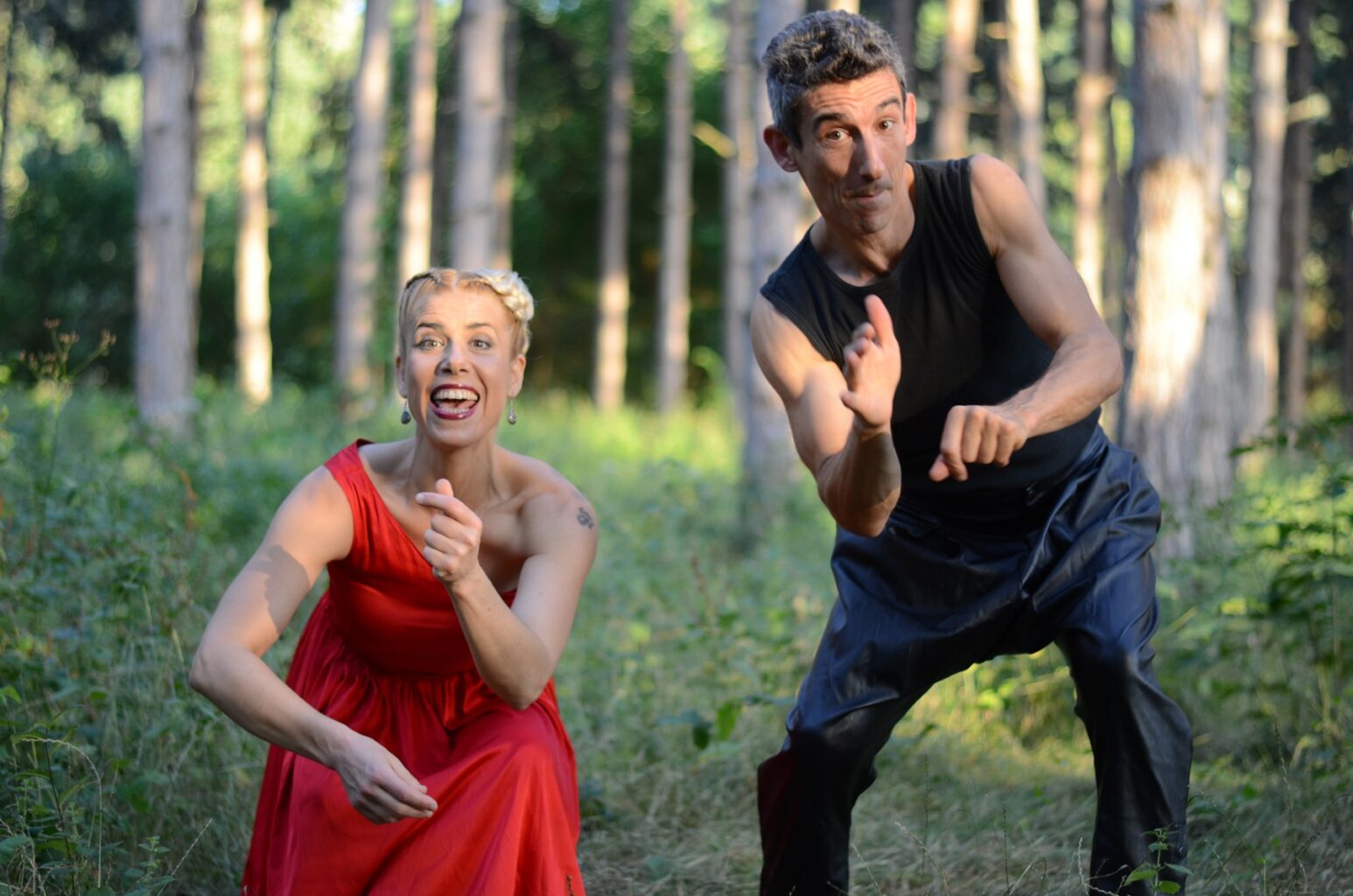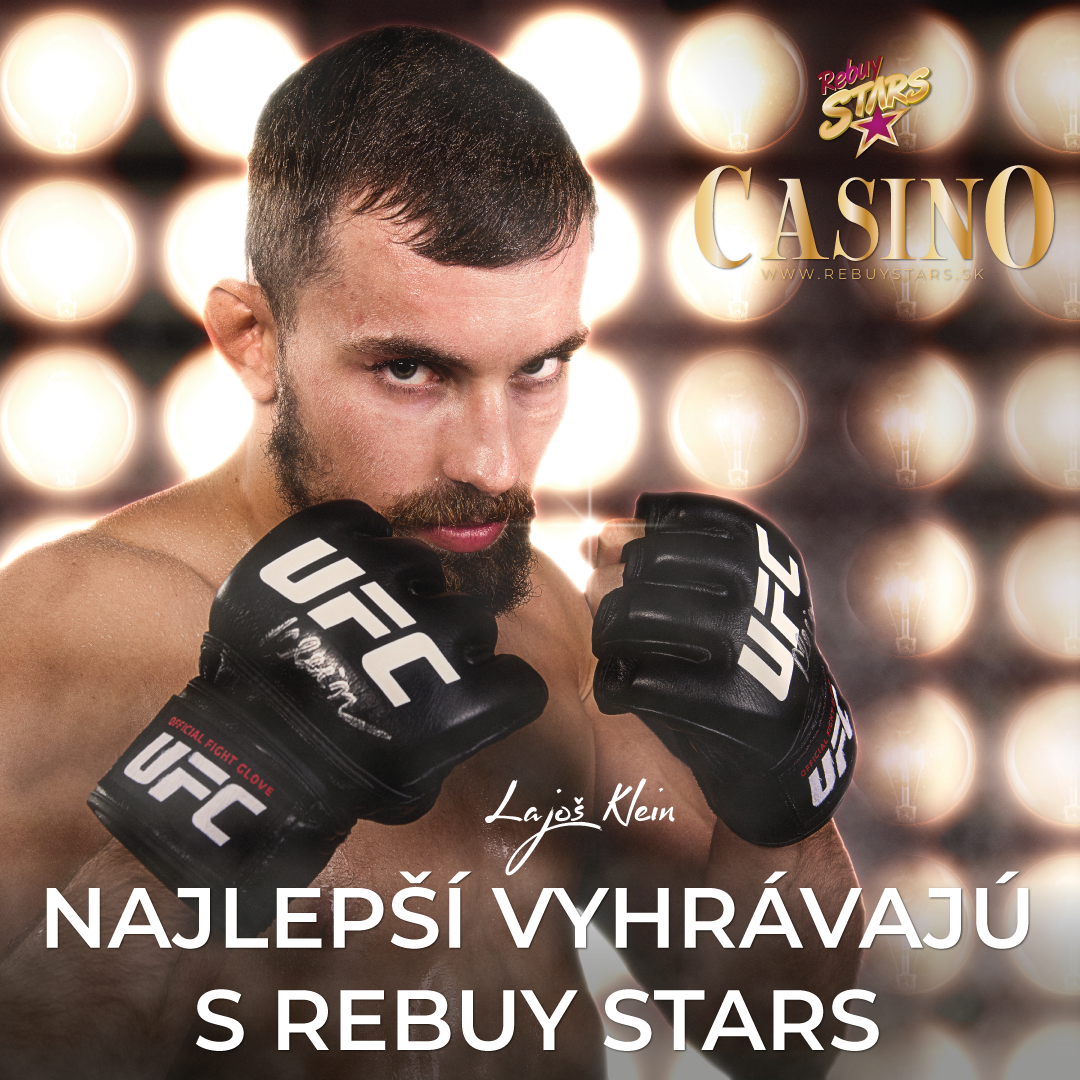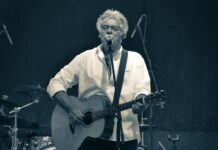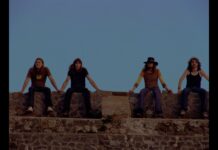“We are together on stage for 27 years! We went to workshops of music, physical movement, dance and theatre together, improvised together. We are quite different, but share a lot of experiences,“ say Ana and Marko in the interview for our online magazine.
I listened to your interpretation of the Bulgarian folk song. You can keep the tempo, speed up, sing in parallel not only in vocal lines, but also in various metro-rhythmic structures. How well do the musicians have to know each other to be in such an interplay and good coordination? Not only rhythm, but we also speak about intonation…
Ana: „Ergen dedo“ is quite complex and it inspired us to use the words as a rhythmical language. Our arrangement is based on Petar Liondev’s for famous Bulgarian State Television choir Le Mystere des Voix Bulgares. Standing on the shoulders of giants, we couldn’t help to give our small contribution. So we built in the various word plays with syllables in a form of musical Q&A. Marko is mostly doing the body percussion arrangement and I am doing the vocal arrangement.
Marko: I remember it was in summer of 2019. We just came from the Body Rhythm festival in Hamburg where we were at a workshop of konnakol of Alex Ostapenko. The idea of the rhythmical language was perfect in combination with the lyrics „e taka, pa taka“ (liberal translation from Bulgarian „that’s how it goes“). So we „butchered“ the words and got rhythm building block. These then meaningless syllables became rich with meaning in artistic interpretation.
Ana: And it is true that we know each other now more than we haven’t known each other (laugh). We met in 1997 in an artistic project, fell in love and married. Our son Vid was born in 1998, daughter Alisa in 2001. We are together on stage for 27 years! We went to workshops of music, physical movement, dance and theatre together, improvised together. We are quite different, but share a lot of experiences. Performing so many years together really helps, but sharing life means that we have a mutual trust and understanding that is different than if we were only colleagues.
Your main idea of the music that you perform is – Telo kao instrument (We also understand this; in Slovak language it sounds similar). Is rhythm for you the most important music element in your performances?
Ana: Body as an instrument is basically name of our workshops and Facebook page for ex-yu audience with 26.000 followers. The technique we use is body music, which is body percussion combined with singing. But our art expression is much more. If you want to put an accent on the rhythm, you can find rhythm also in the dance, in visual, movement on stage, dynamics, direction of the concert, with different songs following each other.
Marko: We like to perform music not thinking of genres, as well as art, not thinking of the separate expressions as music, movement, dance, theatre, education. We do all that while we perform.
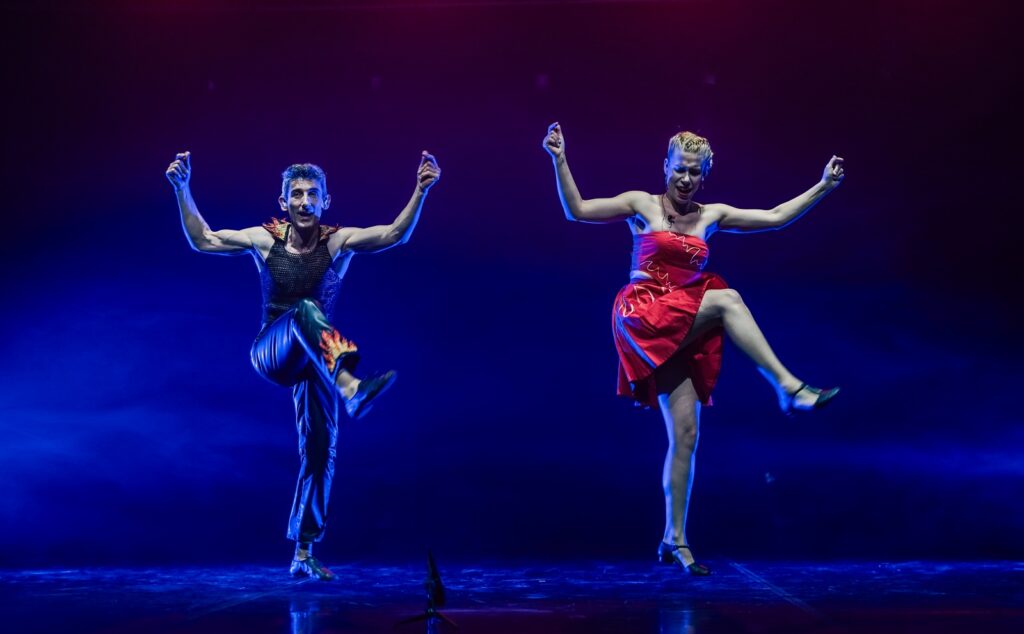
If we talk about rhythm, we also have to talk about metrics. The Balkan music, that inspires you, is well known for the odd metres. For example, we are used to only 2, 4, which is regular, easy and “normal” and sometimes 3, never 5 or 7, 9… When you meet such an audience, for which is not natural to dance or to sing Balkan metro-rhytmic structures, do you have a method how to listen to it in a natural way?
Ana: Music from the Balkans makes Central European heart skip a beat, it is true (laugh). We both like to be surprised by music. When you hear the intro and know the rest of the song, it puts you to sleep and leaves you in the comfort zone. Art is daring, philosophical, it makes you wonder and ask.
Marko: I am a drummer by education, so same old regular metrics became a little boring for me. I like it in combination with odd rhythm, though. That’s why I like to perform music from the Balkans very much.
Because we are body musicians, we stomp and play on our thighs and chest and sing, it’s quite an intimate and personal experience for the audience. There are only natural sounds and being in audience, you can’t help but think in the same time “Oh, my God, this is so complex, I could have never done this” and “This is so natural, anyone can do it, I could, as well”. Music speaks to your body, to your heart, you feel it.
Ana: When we call the audience to participate in the songs, we do a short workshop. We also support them through the songs, so they don’t feel lost in the unknown waters of odd beats! We love our audience. They are always a part of our performance, even if they don’t make music with us. Because there is no barrier between the stage and the seats: we are one.
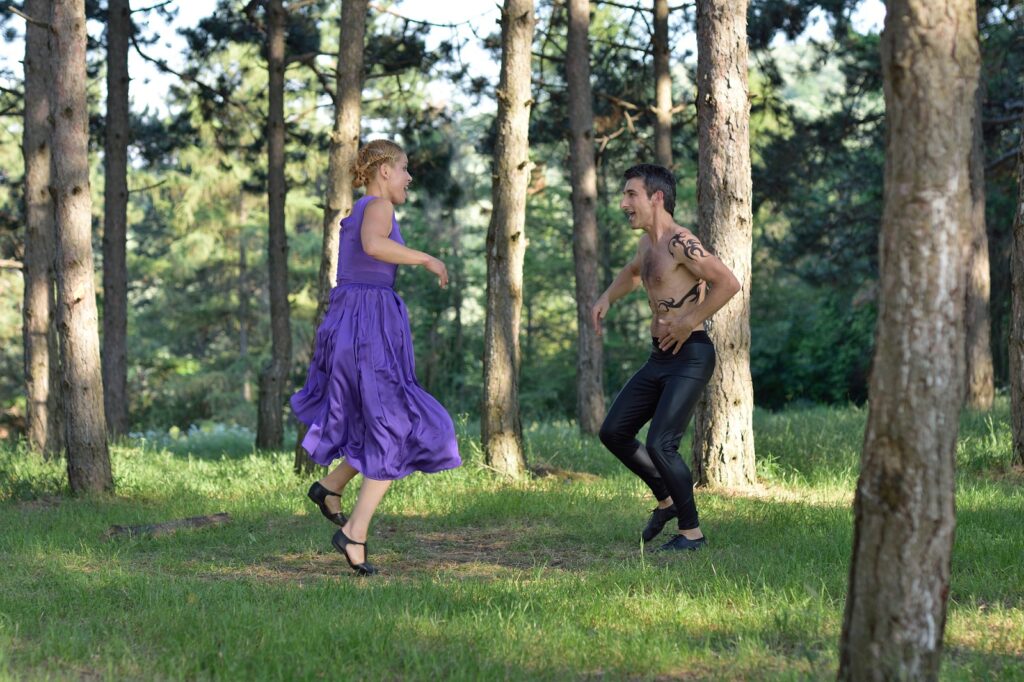
In your performance you often use also theatrical elements. Is the visual appearance of your music important? In what sense?
Ana: Art is one. We separate different forms to have more control and learn the trade, but in the end, it is an experience, for the audience as well as for the artist and his team.
When we talk about Balkans, which music cultures are involved? You cover the music of Macedonia, Bulgaria, Serbia, Romania, Albania, Croatia, Bosnia and Herzegovina, you even sing a Hungarian song or Turkish and Greek. What are the connections of these music cultures to region of the Balkans?
Ana: We understand the Balkans in the broad sense. Since we’ve both been born in former Yugoslavia, we feel this region as our homeland. Not politically repressive Serbia with nationalistic attitude. I think we are not alone in this: most of the people that have the luxury of broader vision feel the same. We perform songs from the whole region, because these are cultures that share a lot: views on life, psychology, values, ethics, religion, education, food – dishes, even musical tunes; we share the language, even if we don’t understand each other. So many words in Serbian come from Hungarian, Austrian or Turkish. Who can say today he is truly of one nation? And this was true for Balkans even centuries ago, because of the melting pot of migrations, wars, foreign rule and forces.
Marko: I can tell you one thing: when we were in Gaziantep, South Turkey, near Syrian border to work and perform for the refugees with German Clowns without borders, men spoke Turkish to me on the street. I think it is because of my strong Slavic genes and blond hair (laugh).
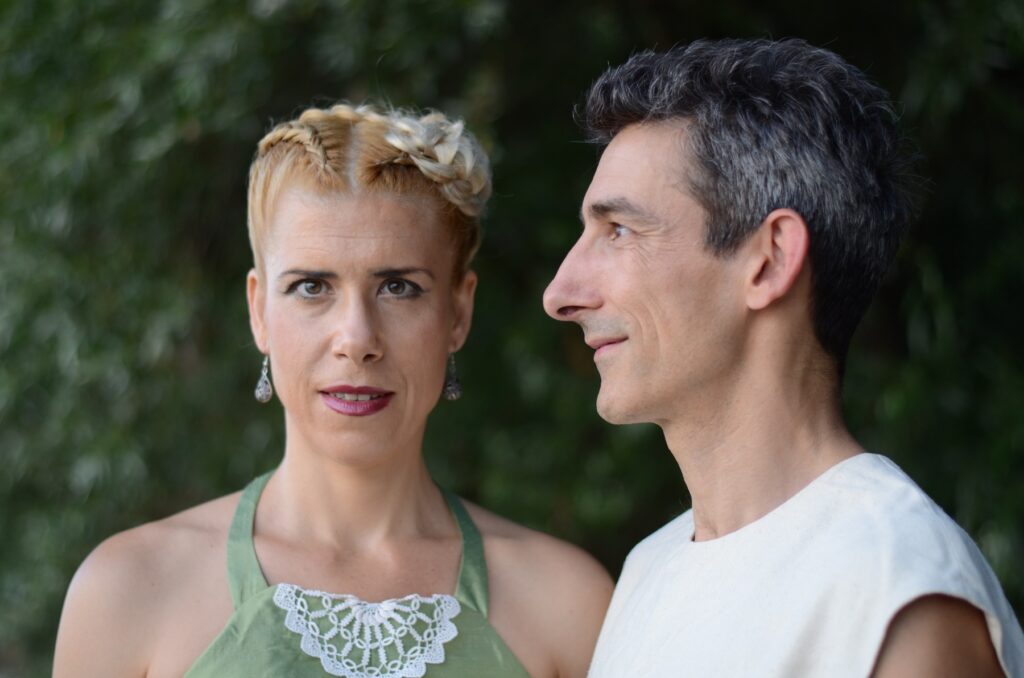
What are your sources for the songs?
Ana: “RikaTaka, New Balkan Rhythm” was released in November of 2022 by German label CPL Music. I sing on 11 languages. Obviously, I do not speak them. I am lucky to have a big network of friends who were happy to help me with the pronunciation, and they also helped a bit with the ideas.
Marko: Every song has a different story. “Bratec kosio”, Croatian song, we know for 25 years. First time we heard it, it gave us goose bumps. We knew we will perform it once.
You connect traditional sound with the modern. The core elements are felt in your music and you add something new. What distinguish the original songs from your new interpretation? I mean, we cannot just talk about a “simple” re-interpretation of traditional songs, right?
Marko: This is a tricky question. What is the simple reinterpretation? What ethnomusicologist recorded on the field and then learn new generations in schools? What you learn from your grandmother as a child? The music evolves. I feel this is the natural way, if not simple.
Ana: We are not trained in traditional music. But the traditional music is special. You feel the roots that reach very far to the ground. You feel the lives of the people, of the community. You feel the collective unconscious expressed, like in fairy tales. It is also a vast field, the sweat from mowing the field of grass or wheat, the sweetness of bread, when you are very hungry, the smile of the loved one from far away, that your family forbids you to see and touch. And this and many more we can shine to the contemporary human, deep in the screen, anxious, full of worries for tomorrow. I also think we need to care for future. But the best way I feel we do is to be present now.
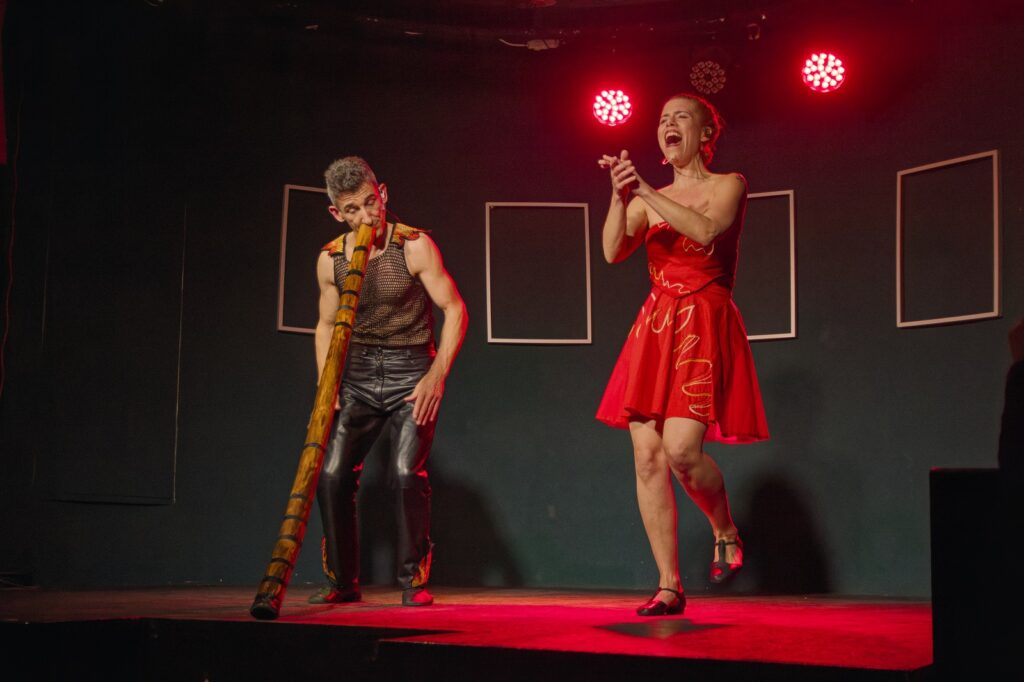
The main energy in your music stem from percussion instruments and also using your bodies. What is the history of this music? When could we see it in the history?
Marko: Body music is the oldest way to make music, no doubt. And there are lot of different traditions or newer art expressions in Africa (step, gumboot), North America (hambone, tap dance), Europe (dance of Hungarian Romani, or Slovakian or Silesian folklore, with men stomping and playing on boots). Even in Pheroe islands there is a form of a singing and dancing game in a wheel with stomping. I am not ethnomusicologist, this is only what I’ve learned from being curious about the subject.
In your singing we hear that you are using a head register. What tones can you range with it? I’m asking on the register because we can hear different colours and a strong expression. Is the ground of this singing in traditional music in the Balkans?
Ana: Curiosity is a driving force in art for me. So I explore all possibilities. I do not have an Academic background, but went to numerous singing classes and workshops, to expand the expression. On my good days I think my range is around three octaves. And my singing style depends of the songs. Blues and jazz are my background, as I sang it and listened to it from my childhood. I also use white voice, as they call it.
In many songs, you have a steady rhythmic structure that doesn‘t change throughout the song. However, the singing, which is variable, changes. We even hear a second voice in it, which uses parallel intervals. Is it a way to get the audience to interact?
Marko: If we’re speaking about my part, it is a way to have a harmony in the musical arrangement, using only two voices and bodies.
Ana: But, in the studio you can always do more. So, we had contributions of different singers and musicians. Of course, I also sang different parts in the accompaniment.
Marko: On the stage we can’t really do much more in this duo setting. There are songs where audience interacts and we use some simple signals to conduct. Because we don’t use loopers or other technical equipment, if we stop there is nobody else to “hold the water”.
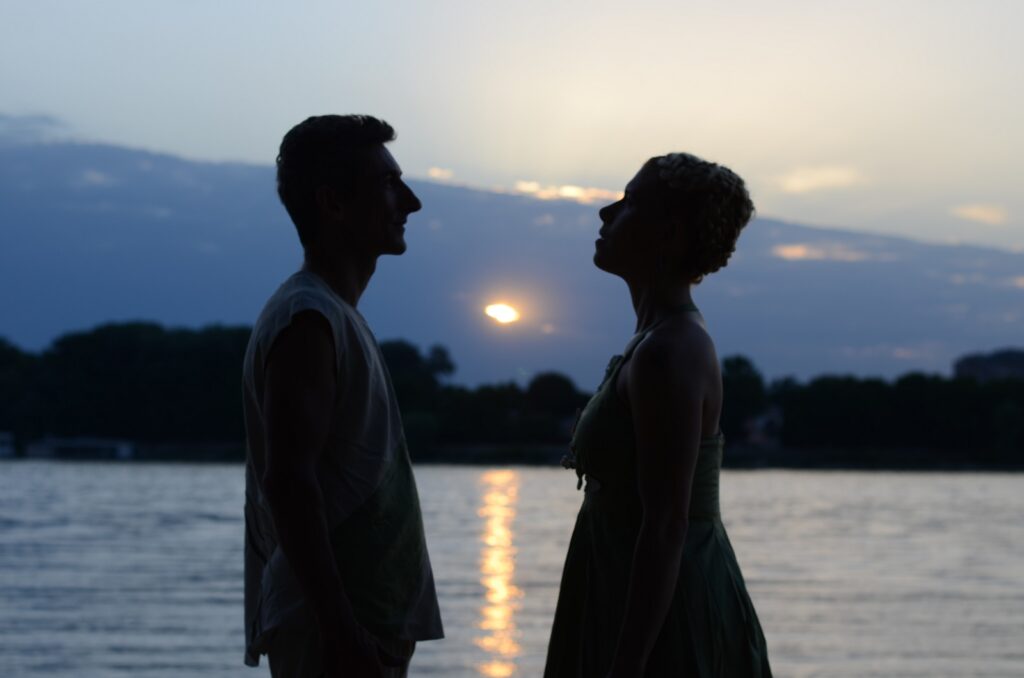
Does the repetitive rhythmic structure also use the psychology of perception? How do you get the audience involved in your concert?
Ana: Listening closely, paying attention is involvement (laugh). And they clap along.
Marko: If we have a special audience, they can also sing with us. This is possible on some events like our festival in Sremski Karlovci New Balkan Rhythm, or when we do a workshop in the place where we give a concert. Large part of audience was at the workshop, then, so they already know what to do!
You also work with gradation in the songs. Are gradations an effective means of catharsis for you? To a stronger effect of music?
Ana: If art has meaning, it is the healing. It is alike for the musician and for audience. We need to be held by it and to find faith and trust: in other people, in the community, in ourselves, in something bigger than us.
Marko: This is part of the trade, right? You know how to put all the parts together to make the right effect. But it is also something else, like Ana describes.

You will have a concert at the World Music Festival in Bratislava. What repertoire have you prepared for the audience?
Ana: We are looking forward to a short residency with Milanosz, vocal band that the festival has put us in touch with. We will play some of the songs they interpret, as well as ones we do. We also have a surprise, a song from Slovakia we prepare especially for the festival. Come and listen!
Nowadays, the original music of different cultures and regions is disappearing. Is it also your goal to preserve these songs?
Ana: As Marko mentioned earlier, the only way of preservation of anything is keeping it alive. Music does not belong in scores, but in the throats and hands of musicians. And if we “spoil” it, we are happy that it survived, even if it is not in the “pure” shape, as “folk police” keeps it.
Marko: If the art and, broadly, culture is to survive, after so many cuts in the budget, it is because it is meaningful to the people. We need to get off the high horse and turn to the broad audience. Because they are hungry for meaning, hope and support.
Zuzana Vachová
Title photo: Alisa Dinjaški


